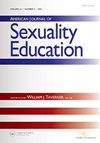‘Wasn’t This Already Considered Sexual Harassment?’: Exploring the Confusion Around the Law Mandating Consent to Receive a Nude Sext Message
IF 1.1
Q2 EDUCATION & EDUCATIONAL RESEARCH
引用次数: 3
Abstract
Abstract With the majority of individuals in the United States owning a mobile device, communicating via text is popular. Many individuals who text also engage in sexting, commonly defined as sending a sexually suggestive or explicit message that can include a nude image. In September of 2019, Texas passed a law prohibiting the sending of an unsolicited nude image without consent from the receiver. The goal of the study was to capture the reactions of individuals to this state law. There were 400 different responses by 400 different individuals posted on Reddit by users expressing their reactions to the passing of the state law. Initial reactions were captured, chosen from specific Reddit threads containing the link to the law within 1 month of the law being passed. These comments were collected and the research team used thematic analysis to highlight the themes to users’ responses to the sexting law. Of note was the sizeable number of individuals who disapproved of the law, highlighting a lack of knowledge about consent to engage in sexual behaviors in general, the need to gain consent to engage in sexting, and a misunderstanding of what defines sexual harassment. Implications for sex education programs and policy makers are discussed.这不是已经被认为是性骚扰了吗?:探索关于强制同意接收裸体色情短信的法律的困惑
随着美国大多数人拥有移动设备,通过文本交流很受欢迎。许多发短信的人也会发色情短信,通常被定义为发送性暗示或露骨的信息,其中可能包括裸照。2019年9月,德克萨斯州通过了一项法律,禁止在未经接收者同意的情况下发送未经请求的裸照。这项研究的目的是捕捉个人对这项州法律的反应。Reddit上有400个不同的人发表了400条不同的回复,表达了他们对州法律通过的反应。最初的反应被捕获,从特定的Reddit线程中选择,其中包含法律通过后一个月内的法律链接。这些评论被收集起来,研究小组使用主题分析来突出用户对色情短信法的反应的主题。值得注意的是,有相当多的人不赞成这项法律,这凸显了人们对性行为的同意缺乏了解,对发送性短信需要获得同意,以及对性骚扰的定义存在误解。讨论了对性教育计划和政策制定者的影响。
本文章由计算机程序翻译,如有差异,请以英文原文为准。
求助全文
约1分钟内获得全文
求助全文
来源期刊

American Journal of Sexuality Education
EDUCATION & EDUCATIONAL RESEARCH-
CiteScore
2.40
自引率
8.30%
发文量
39
期刊介绍:
The American Journal of Sexuality Education speaks directly to the distinct, professional needs of sexuality educators and trainers. This peer-reviewed journal provides sexuality educators and trainers with current research about sexuality education programming, best practices, sample lesson plans, reports on curriculum development and assessment, literature reviews, scholarly commentary, educational program reports, media reviews (books, videos, internet resources, and curricula), and letters to the editor. The American Journal of Sexuality Education addresses a variety of sexuality topics and audiences, presenting up-to-date theory and practice, lessons, and evaluations.
 求助内容:
求助内容: 应助结果提醒方式:
应助结果提醒方式:


